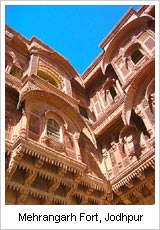| Umaid
Bhawan Palace (Jodhpur) |
 Introduction: Introduction:
Umaid Bhawan Palace is a palace located at Jodhpur, Rajasthan,
India. Umaid Bhawan Palace was originally called Chittar Palace
during construction, due to its location on Chittar Hill,
the highest point in Jodhpur. Ground for the foundations of
the building was broken on 18 November 1929 by Maharaja Umed
Singh, it was unfinished until 1944. Umaid Bhawan was one
of the last royal constructions (and India's last Palace),
built to provide work and drought relief for the poor. The
building is dramatically illuminated at night causing some
controversy in a city that continues to endure daily multi-hour
power cuts. Named after Maharaja Umaid Singh, grandfather
of the present Maharaja of Jodhpur, this golden-yellow sandstone
monument was conceived on the grandest possible scale, in
the fashionable Art Deco style of that time. After 15 years
in construction, the 347-room palace was finally completed
in 1943 – and has served as the principal residence of the
Jodhpur royal family since. Taj Umaid Bhawan Palace at Jodhpur
is one of the largest and grandest private residences in the
world. The palace was built by 3000 artisans worked over 14
years. The palace consumed one million square feet of the
finest marble.
Umed Bhawan Palace exudes an aura distinctly its own.The Palace
hotel subtly blends Rajput and Victorian architecture.Lush
lawns and courtyards,picturesque ceilings,marble corridors,treasure
troves, hunting trophies of yesteryears and exquisite royal
heirlooms complete the regal picture.Since olden days, the
Maharaos of Kotah (as Kota was formerly called) had always
lived in the medieval Fort inside the city. Wanting a modern
palace for his personal use, Maharaja Umed Singh II settled
for nothing but the best. He commissioned Sir Swinton Jacob,
a distinguished officer of the Royal Engineers in the British
Army, to design the building. As expected, Umed Bhawan came
up in 1905 in the prevalent Indo-Sarcenic style. Plentiful
supply of white Khimach and Pink Sandstone from nearby quarries
helped, while Italian marble, among other things, had to be
imported for flooring. Umed Bhawan Palace exudes as aura distinctly
its oqn, suggesting the hues of the nearby desert, Steeped
in history, the Palace hotel subtly blends Rajput and Victorian
architecture. Lush Lawns and courtyards, picturesque ceilings,
marble corridors, treasure troves, hunting trophies of yesteryears
alongwith excuisite royal heirlooms complete the regal picture. |
|
|
|
 |
All rights
Reserved. Best Viewed at 1024 x 768 using Netscape or Internet
Explorer version 5.0 or above.
Copyright ©2006-2007 CR License, LLC. All Right Reserved.
Terms of Use | Privacy Policy | Travel Agents |
|
|

